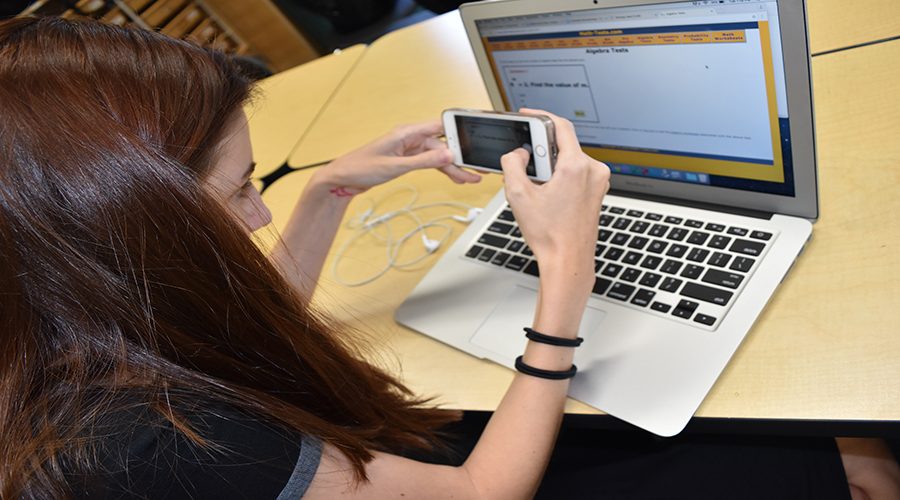A total of 43 pages make up the student handbook, detailed with rules and regulations. But not a single page includes the expectation surrounding academic integrity that teachers enforce in their classrooms.
ŌĆ£Academic integrity is the right thing to do, but sometimes, I feel so much pressure to do well or I just donŌĆÖt have enough time or even feel like doing it. I do slip a little on integrity, but overall I try to balance all of my activities as well as I can but sometimes you canŌĆÖt,ŌĆØ an anonymous senior said.
According to the academic integrity policy at the University of Oklahoma, academic integrity ŌĆ£is when students have honesty. Assignments exist to help students learn; grades exist to show how fully this goal is attained. Therefore, all work and all grades should result from the student’s own understanding and effort.ŌĆØ
Although the school handbook lacks the information regarding what it ┬Āmeans to have academic integrity, history teacher Jeffrey Chazen thinks it is crucial to be honest in all of your work regardless if it is in the handbook or not.
ŌĆ£It is a perfect life lesson to have academic integrity because it is a mark of who you are as a person. Show me someone who lacks academic integrity and I will show you someone who probably lacks integrity in their other life interactions. ┬ĀWould you want to work for someone who lacks integrity?ŌĆØ
The Pathfinder conducted a survey and 65 percent of the students who participated in it ┬Āaffirmed that success in a class is more important than their integrity or doing the ŌĆ£rightŌĆØ thing.
ŌĆ£Success is more important, because colleges canŌĆÖt read my integrity on a transcript,ŌĆØ senior Bryan Zhang said.
Academic integrity is not only working alone on test and quizzes, but also doing homework and class assigned work alone, according to University of Missouri. ┬ĀHowever, students, such as junior Hannah Hoffmann, view class work as something that can be worked on with other people.
ŌĆ£I used to be super uptight if anyone even asked to look at my homework, I instantly assumed they were a bad student,ŌĆØ Hoffmann said. ŌĆ£Once I got to high school, though, I realized that students are all frantically trying to keep our heads above water as we deal with schoolwork especially for honors classes, jobs, sports, family and friends. We are all overcommitted and weŌĆÖre all just trying to help one another.ŌĆØ
Sophomore Olivia Riemer feels similarly to Hoffmann; she believes working with others on small assignments helps everyone succeed. ┬Ā
ŌĆ£I know a lot of teachers donŌĆÖt like class work to be worked on with other people, but we arenŌĆÖt doing the assignments together to only finish them, but to create a better understanding. Just like how we learn from our mistakes, we learn from other people,ŌĆØ Riemer said.
Sparknotes is an online resource that is centralized to help people understand mainly English based information. Out of the 93 percent of Pathfinder survey participants that said they use Sparknotes as a supplementary resource, 33 percent of them stated that they use it instead of doing the assignment themselves.
ŌĆ£If it is in replacement of students doing an assigned reading or class curriculum then I certainly don’t support it. It should not be used as a substitute for actual class content. If it is being used to supplement and reinforce content, then it’s a little more acceptable,ŌĆØ history teacher Annie Wayland said.
ŌĆ£After I read a book, I use Sparknotes as a review tool before going into discussions to make sure I understood everything. It doesn’t have to be used for cheating.” – Anonymous
Students also found that technology makes it easier to cheat, according to the 84 percent of students who participated in the Pathfinder-conducted survey.
ŌĆ£Pictures through phones, group chats, and online group work make cheating easier than ever. ┬ĀAlthough cheating will only get you so far. You can’t ŌĆścheatŌĆÖ your way through life,ŌĆØ Wayland said. ŌĆ£In addition to it impacting your life academically, it rolls over into other aspects of your life and challenges your character outside the classroom too. Cheating really is cheating yourself out of your own future.ŌĆØ
According to a study by Sara Rimm-Kaufman, PhD, and Lia Sandilos, PhD, University of Virginia, who study the relationships between people and their performance,┬Ādistrust can be detrimental to the relationship between a teacher and student.
ŌĆ£I want my teachers to trust me and know I am capable of thinking on my own, I just want them to have faith and let me do my work,ŌĆØ Riemer said.
To prevent students from cheating, Wayland walks around her classroom during tests and makes sure there is not any hand held technology out.
ŌĆ£My physical presence and walking around during tests is one of the things I do. I also make sure students put up their phones in cell phone pockets so they are not accessible or tempted to use them in an improper way,ŌĆØ Wayland said.
While walking around a classroom may prevent students from cheating, an anonymous freshman feels that it makes their performance weaker than they would want it to be.
ŌĆ£Teachers who think it is necessary to put up 30 dividers between [their] students and then circle them like a vulture in hopes of catching a cheater during a test, [is] just making students do worse. Teachers should trust us more.” ┬Ā– Anonymous
Teachers encourage integrity to not only help a student’s career in school, but in the future.
ŌĆ£Academic integrity directly reflects who you are as a person. ┬ĀIt’s a moral code based on your values and character as a person. ┬ĀIf you put success or grades above integrity and your values, it means you are willing to sacrifice integrity to achieve those things. Integrity must remain at the top of our educational value system,ŌĆØ Wayland said.




![Freshman Daphne Stokes looks at a table with Veterans Day flyers and information on Nov. 11. Stokes, along with other West High students, like senior Alexander Lewinski, passed by the table in the cafeteria with army recruitment information and giveaways for students to observe during lunch. ŌĆ£Talking with [the recruiters] has definitely helped me [find] where I wanted to go, more than anything else,ŌĆØ Lewinski said.](https://pwestpathfinder.com/wp-content/uploads/2025/11/DSC_1227-2-1200x800.jpg)
![Helping a customer, print room assistant Gretchen Williams operates her booth at the West High Craft Fair from Oct. 25-26. This was WilliamsŌĆÖ first time participating in the Craft Fair with her new craft shop, Gs Beaded Boutique. ŌĆ£People have always said, over the years, ŌĆśyou should open something.ŌĆÖ [I replied that] I would rather just make [my crafts as] gifts for people. I just started [the online store] up, and it's been okay. I'm always surprised [by] how many views I get and [the] people from different states buying things; somebody from Alaska bought something the other day.ŌĆØ](https://pwestpathfinder.com/wp-content/uploads/2025/11/DSC0451-2-1200x799.jpg)
![Gesturing toward the clubŌĆÖs name on the board, Global Youth Aid co-president year Daniah Alsagheer discusses upcoming service projects with members during a meeting on Oct. 30. ŌĆ£We might be one club at one school, but together, weŌĆÖre [part of] something much bigger,ŌĆØ Alsagheer said.](https://pwestpathfinder.com/wp-content/uploads/2025/11/DSC00949-1200x800.jpg)
![Focused on providing exceptional service, sophomore Darsh Mahapatra carefully cleans the door of a customerŌĆÖs car. Mahapatra has always believed his customers deserve nothing less than the best. ŌĆ£[If] theyŌĆÖre trusting us with their car and our service, then I am convinced that they deserve our 100 percent effort and beyond,ŌĆØ Mahapatra said.](https://pwestpathfinder.com/wp-content/uploads/2025/10/DSC_0018-1200x800.jpg)
![Sophomore Aleix Pi de Cabanyes Navarro (left) finishes up a soccer game while junior Ava Muench (right) warms up for cross country practice. The two came to Parkway West High School as exchange students for the 2025-2026 school year. ŌĆ£The goal for the [exchange] program is to provide opportunities for both Parkway students and our international exchange students to learn about other cultures, build connections and become confident, capable, curious and caring ŌĆö ParkwayŌĆÖs Four CŌĆÖs ŌĆö in the process,ŌĆØ Exchange Program Lead Lauren Farrelly said.](https://pwestpathfinder.com/wp-content/uploads/2025/10/Feature-Photo-1200x800.png)

![Gazing across the stage, sophomore Alexis Monteleone performs in the school theater. The Monteleone familyŌĆÖs band ŌĆ£Monte and the MachineŌĆØ has been releasing music since 2012, but Alexis started her own solo career in 2024 with the release of her first single, Crying Skies. ŌĆ£My whole family is very musical, [and I especially] love writing [songs with them],ŌĆØ Monteleone said.](https://pwestpathfinder.com/wp-content/uploads/2025/09/DSC7463-1200x798.jpg)
![Amid teaching a lesson to her AP Calculus BC class, Kristin Judd jokes alongside her students in their funny remarks. Judd has always enjoyed keeping the mood light in her classroom, along with on the volleyball court. ŌĆ£[I enjoy] that side talk where you see [or] overhear a conversation and chime in, or somebody says something funny,ŌĆØ Judd said.](https://pwestpathfinder.com/wp-content/uploads/2025/09/image-1200x730.jpg)
![Eyeing the ball, junior Ella McNeal poses for her commitment pictures at Clemson University. McNealŌĆÖs commitment comes after months of contact with top Division 1 soccer programs. ŌĆ£ It has taken a lot to get to where I am, but I know that [what] I've already been through is just the beginning, and I can't wait for what is to come,ŌĆØ McNeal said.](https://pwestpathfinder.com/wp-content/uploads/2025/09/IMG_4926-1200x900.jpeg)
